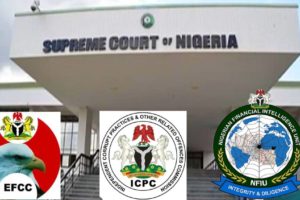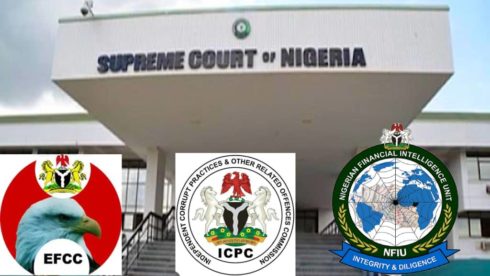The Supreme Court of Nigeria has dismissed a groundbreaking lawsuit challenging the constitutionality of three pivotal anti-corruption agencies: the Economic and Financial Crimes Commission (EFCC), the Independent Corrupt Practices Commission (ICPC), and the Nigerian Financial Intelligence Unit (NFIU). This legal challenge, led initially by the Attorney General of Kogi State, sought to invalidate the legislation that established these agencies, arguing it undermined the federal structure enshrined in the Nigerian Constitution. The lawsuit questioned whether the Federal Government had the authority to create entities with mandates that potentially encroach on state powers.
As the case progressed, additional state governments aligned with Kogi’s position, amplifying the lawsuit’s scope and significance. These states argued that the centralization of anti-corruption efforts diminished their jurisdiction over financial governance and law enforcement. Their united front presented a direct challenge to the Federal Government’s authority in the fight against corruption, raising fundamental questions about the balance of power in Nigeria’s federal system and the role of these agencies in national governance.
Supreme Court: The Core of the Legal Dispute
The plaintiffs argued that the laws establishing these agencies violated the constitutional principle of federalism. They alleged that the agencies’ mandates infringed upon the legislative and executive autonomy of states, particularly in financial oversight and anti-corruption measures.
The lawsuit contended that the EFCC, ICPC, and NFIU were effectively usurping roles traditionally reserved for state governments. This legal battle raised critical questions about the balance of power in Nigeria’s federal structure, setting the stage for a definitive ruling from the Supreme Court.
Supreme Court Ruling: Case Dismissed
In a landmark judgment, the Supreme Court unequivocally dismissed the lawsuit, affirming the constitutionality of the EFCC, ICPC, and NFIU. The court held that these agencies are essential for combating corruption and financial crimes, emphasizing that their establishment aligns with the overarching national interest.
The apex court also highlighted the importance of collaboration between federal and state governments in tackling corruption. It noted that the centralization of anti-corruption efforts does not undermine federalism but rather strengthens governance by addressing systemic challenges.
Implications for Governance and Federalism
The ruling has far-reaching implications for governance in Nigeria. By upholding the legality of these agencies, the Supreme Court has reinforced the Federal Government’s authority to establish mechanisms for combating corruption, regardless of state opposition.
This judgment also redefines the relationship between federal and state powers, affirming the primacy of national interests in areas such as financial regulation and anti-corruption efforts. It sets a precedent for future legal disputes concerning federal and state jurisdiction.
Reactions from Key Stakeholders
The judgment has elicited mixed reactions from stakeholders. While the Federal Government and anti-corruption advocates have hailed the ruling as a victory for accountability and transparency, some state governments have expressed disappointment, viewing the decision as an erosion of their autonomy.
Civil society organizations and legal experts have also weighed in, describing the ruling as a pivotal moment in Nigeria’s fight against corruption. They have called for stronger collaboration between federal and state entities to ensure effective implementation of anti-corruption policies.
Strengthening Anti-Corruption Frameworks
With the Supreme Court’s decision, attention now shifts to strengthening the operational capacity of the EFCC, ICPC, and NFIU. Experts have called for increased funding, enhanced training, and legislative support to empower these agencies in their fight against financial crimes.
The judgment also underscores the need for broader reforms in Nigeria’s federal structure to prevent future conflicts. Stakeholders have urged the government to prioritize dialogue and cooperation to address the concerns raised by states, ensuring a balanced approach to governance and anti-corruption efforts.
Table of Contents
Discover more from OGM News NG
Subscribe to get the latest posts sent to your email.














